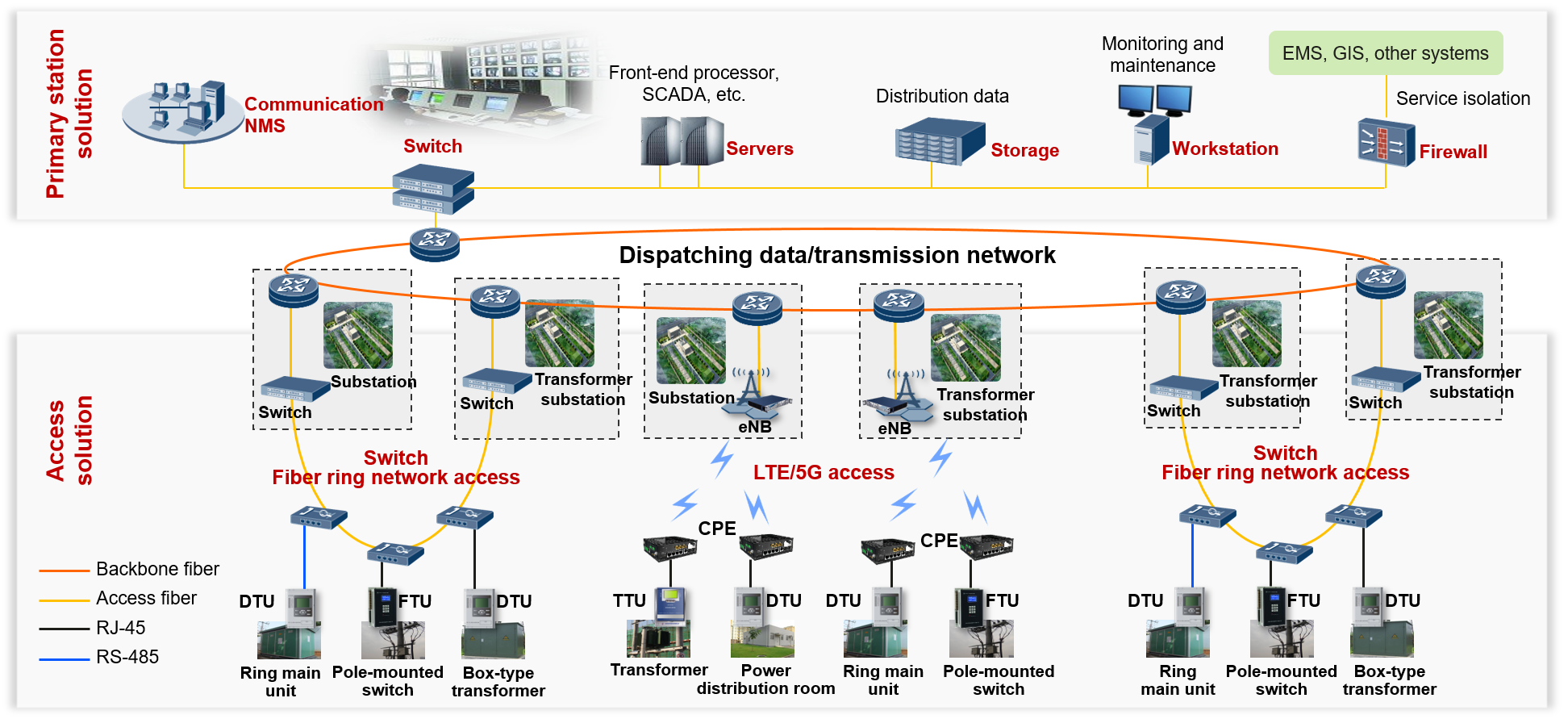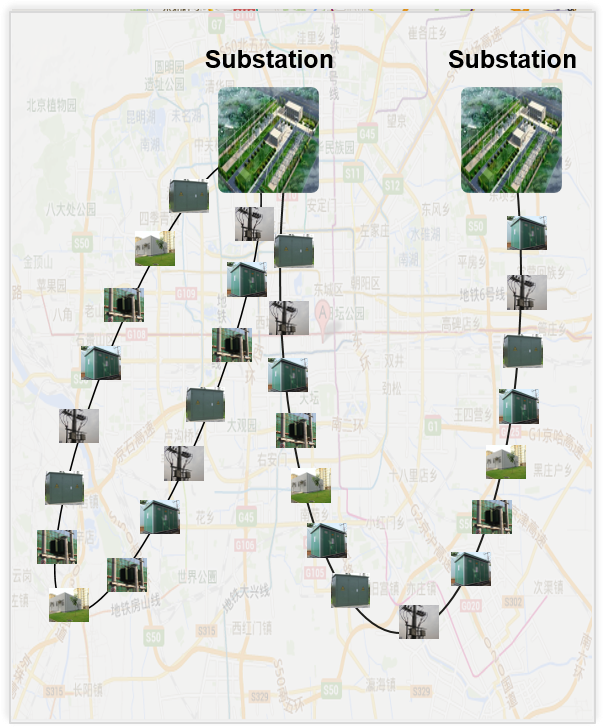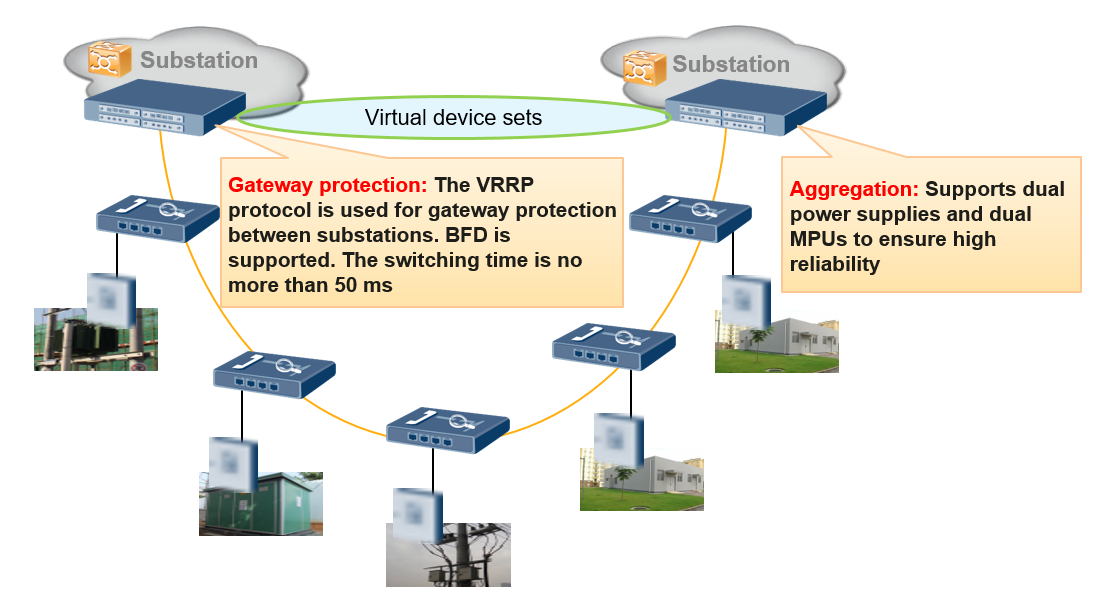Продукти, рішення, послуги для організацій
Today, public and private demands alike are stretching the power supply. To ensure supplies are continuous and stable, power companies must reduce the time taken to locate and isolate faults. They must work to shorten the duration of power outages by recovering power supply as quickly as possible. The power supply quality has to be improved, and the power distribution network is the key to doing so. It receives electricity from either the transmission network or power plants and distributes it to various types of customers. It has a direct impact on user satisfaction and the standard of power supplies, and is the foundation for intelligent power grids.
Currently, the network architecture and coverage of distribution networks vary greatly across different scenarios, and the corresponding distribution communication network technologies are diverse. The industry is having a tough time selecting the right solution to ensure secure and stable distribution communication network operations. Currently, mainstream power distribution communication networks use optical fiber communication and mature 3G/4G/5G wireless communication technologies to offer ubiquitous access for power distribution devices.
To meet the requirements of intelligent power distribution across various scenarios, Huawei's Datacom Product Line launched an intelligent power distribution communication network solution based on industrial switches and routers. In the FTTS scenario, the solution supports flexible networking based on different power distribution network architectures like tree architecture and ring architecture. Industrial switches in power distribution rooms, ring main units, and outdoor cabinets are connected to various xTUs, and industrial switches are connected by optical modules and optical fibers to form an all-optical Ethernet network. In scenarios where there is no fiber leading to the site but there is wireless public network coverage, the solution uses 4G/5G industrial routers as CPEs to implement convenient site access. In places with a high user density, like factories and urban areas, optical fiber communication and wireless public network communication back up each other, improving network reliability and power supply quality.
Huawei has launched the next-generation CloudEngine S5735I-S-V2 DIN series industrial switches, which provide flexible GE access and GE/10GE uplink ports. The switches support an industrial-grade operating temperature range as well as surge protection and can be installed in outdoor cabinets that are exposed to harsh conditions. They also support guide rail installation, saving time and economizing on space.
In addition, Huawei's NetEngine AR630/AR502H series router gateways are designed for industrial application scenarios. They integrate multiple functions including routing, switching, VPN, security, and wireless access, and supports 4G and 5G access. The solution meets the communication requirements of power distribution facilities in remote areas.

The architecture of the Huawei intelligent power distribution communication network has the following advantages:
1. Large bandwidth and long distance: The switch provides GE/10GE ports for networking, meeting the bandwidth requirements brought by a large number of automatic video surveillance deployments on the distribution network. The industrial switch solution is based on an active optical network. The communication coverage distance and the number of communication network nodes are not limited by optical power attenuation, achieving a long-distance communication coverage of over 20 km.

2. Flexible expansion: The power distribution network is frequently expanded. The number of power users in the high-tech industrial development zone is rising and the area of power consumption in newly built residential areas increases year by year. Switch networking allows users to flexibly add or delete nodes based on site access requirements. In addition, new device deployment and topology deleting do not involve recalculation of split ratios or adjustment of optical links. Easy and fast plug-and-play is supported. Therefore, industrial switches are preferred in power distribution communication scenarios where constant capacity expansion is required.

3. Fast self-healing: The industrial switch solution uses a series of network reliability protection technologies to ensure high reliability of the power distribution communication network. Gateway switches are deployed in substations. Gateways of different substations can back up each other. BFD+VRRP are used to implement gateway redundancy protection. For the access ring, ERPS is used to protect services. The self-healing time for a single point of failure is less than 50 ms.

The power distribution communication network technology based on industrial switches and routers is one of the mainstream optical fiber communication technologies in the power distribution communication field. Huawei's intelligent power distribution communication network solution is based on this technology and has been widely deployed on power distribution networks in China, Türkiye, and Saudi Arabia. Huawei will continue to work with ecosystem partners to promote the global application of the intelligent power distribution communication network solution. Together, they will help power customers achieve secure, efficient, green, and innovative transformation and upgrades, and pave a digital road for global energy transition and carbon neutrality.
Disclaimer: The views and opinions expressed in this article are those of the author and do not necessarily reflect the official policy, position, products, and technologies of Huawei Technologies Co., Ltd. If you need to learn more about the products and technologies of Huawei Technologies Co., Ltd., please visit our website at e.huawei.com or contact us.